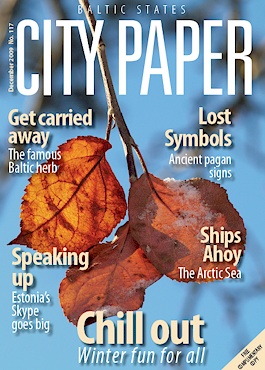Season For Singing
 Visitors to Estonia and Lithuania this year will be surrounded by the sound of music; folk music. The equivalent of the Olympics, these celebrations take place only about every four years, bringing together tens of thousands of singers, dancers and spectators.
Visitors to Estonia and Lithuania this year will be surrounded by the sound of music; folk music. The equivalent of the Olympics, these celebrations take place only about every four years, bringing together tens of thousands of singers, dancers and spectators.
This year marks Estonia's 25th song festival and 18th dance festival named "To Breathe as One." The climax of Millennium Vilnius events, is the Lithuanian Song Festival "Songs of the Centuries," sure to also rival the grandeur of the Olympics.
The Baltic region is most well known for its songs and soulful melodies, which led to the creation of the festivals over one hundred years ago.
In 1869 in Tartu, Estonia, the first Song Festival was held, due to the popularity of singing and playing instruments at the time. Choirs had already formed, and it seemed logical that in the period of National Awakening, that a nation-wide festival would be held.
A singing group led by Johann Voldemar Jannsen began in 1860 and formulated the idea of a sort of song celebration. The first festival nine years later featured 51 male choirs and bands with 845 singers in Tartu. However, only two songs at the time were in Estonian, "Mu isamaa on minu arm" and "Sind surmani."
It was here at this event that the foundations for broadening the ideas of a national awakening were established.
The tradition continued into the time of freedom for Estonia after 1918, and also took place during the Russian occupation, where many foreign songs were sung.
Since the Singing Revolution in 1988, the Estonian song festival has grown even larger, and now features about 30,000 participants.
The festival this year will be held from July 2-5 at the Tallinn Song Festival Grounds.
Lithuania will be holding their celebrations the same week, July 1-6, all over Vilnius. The theme for this year is beautifully summed up by the creators:
"The current of time has no end, time runs from the past to the future, from eternal darkness to immortal light, from the profound to unattainable heights, from the bottom roots to a splendid blossom, glistening in our hopes like the sun. This is how an immortal oak, the tree of our world, grows. A loud-voiced bird of our songs has alighted from the heavens and settled on its crown, singing out new tunes of millenary songs, the sutartinės (from the word sutarti – to accord, consent) of our contrasting Dalia (Destiny), whose diverse voices are incessantly weaved into one cloth by our common Laima (Fate). To consent does not mean to wear the same face and sing in one voice, yet to hear the one beside while singing your unique song and feel the hearts of all of us molding into one single Lithuania, just like effuse branches of an oak melt into one crown, one SONG OF THE CENTURIES humming through thousands of years."
The first Lithuanian Song Festival was held in 1924, and every five years since. As in Estonia, the 1960s brought a period of national renewal, where identity was renewed through a folk revival to protest the Soviet organized state song festivals.
The festival will open in Sereikiskiu Park and Cathedral Square at 5:00 p.m. on July 1 with the program "Here for a Thousand Years Now". The whole week following the opening will feature countless performances by singers and folklorists, and comes to an end July 6 with the final concert "Songs of a Thousand Dawns for Lithuania" in Vingio Park.
To truly understand the culture of the Baltics, it is vital to understand the importance that music has played in their creation, their lives and ultimately their future. If a gaggle of blondes parading through the streets of Riga could lift the crisis ridden spirits of Latvia, imagine what tens of thousands of singers can do for the spirits of the rest of the region.




